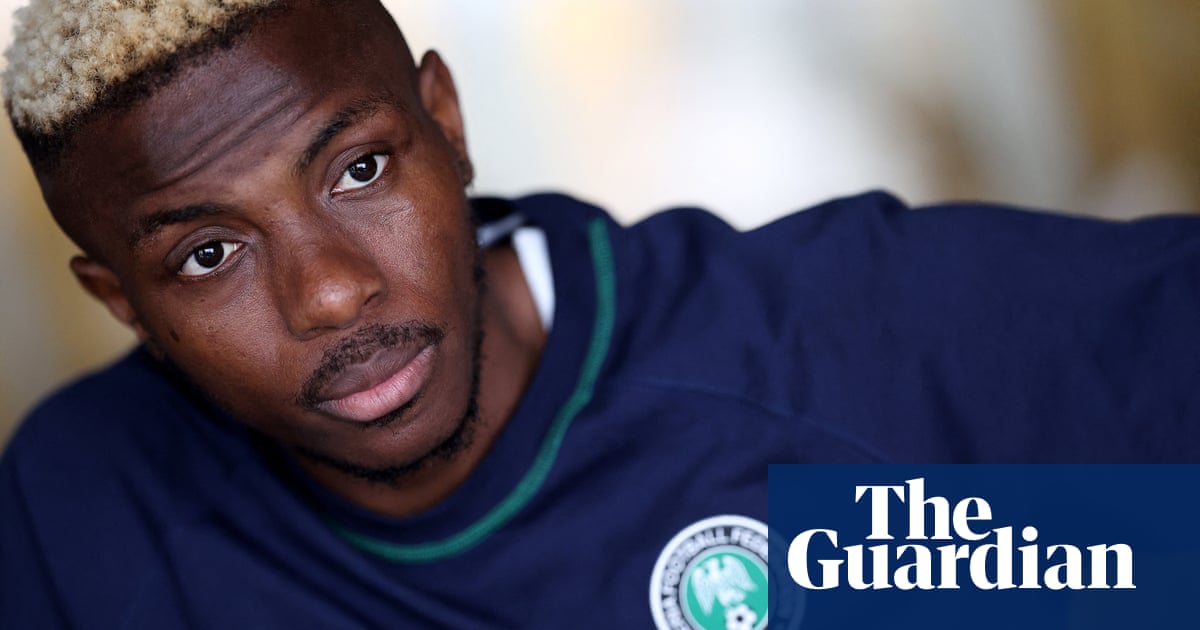
Victor Osimhen is the current African footballer of the year and is critical to Nigeria’s quest for a fourth Africa Cup of Nations title in Ivory Coast but his career in football could have turned out very differently, and very badly.
The striker has won a Serie A title with Napoli, and became the first African to be the league’s capocannoniere (top scorer), but Osimhen’s career in Europe, in its early stages, came close to ending before it had barely began.
His move to Wolfsburg in 2017, following his title-winning performance with Nigeria’s Golden Eaglets at 2015’s Under-17 World Cup in Chile did not go to plan. He was unable to break into the side, leaving him forlorn and frustrated.
“There was a time I spoke to my former agent and told him that I was ready to go to a third or fourth division club in Germany, as all I wanted to do was to play … My whole life has been a struggle but I always come out on top,” he tells the Guardian.
“Whatever bad things happened there, I take full responsibility for it. It was my decision to go to Wolfsburg, to try to improve, because I knew that I was still a work in progress after the World Cup in Chile. I had Mario Gómez there, Divock Origi too. I had to learn from these people … I was rejected by two clubs in Belgium before I had the opportunity to sign for Charleroi on loan.
“I cannot lie: it was draining at first. I was the highest goalscorer at the Under-17 World Cup and picked as the second-best player of the tournament [but then seeing] my career going down and hearing people say all sort of [negative] things about me … I know the kind of player I am and the quality that I possess. I knew that just one season will change my life for ever.
“It was my move to Belgium, to Charleroi [in 2018], that was the turning point in my life. I owe my success to the president of the club, and the people of Charleroi that put their love and trust in a 19-year-old boy trying to establish himself.”
At Napoli, where he has played his football since 2020 after a s outstanding season at Lille, he has metamorphosed into a ruthless predator who is now a transfer target for the world’s top clubs.
“There were a lot of high expectations when I came to Napoli but I had a series of injuries and then Covid set in. But the people never gave up on me. A lot of them cheered me up, sending me messages, sending me flowers … They showed me a lot of love. Helping them to win the Scudetto is something I am grateful to God for, because I was able to repay the trust that they had in me … It’s an honour to play at the Diego Maradona Stadium and hear them chant my name every time I score.”
Leaving southern Italy for pastures new is not in his plans for now. “I have to respect my contract,” he says. “Whatever happens in the summer everybody will know. For now I am at the Afcon and I am focused on that.”
But Osimhen is not all about football. Growing up in Olusosun, an area on the outskirts of Lagos, Nigeria’s most populous city, he is acutely aware of the biting nature of generational poverty.
“Olusosun is a small community close to a dump site. Most of the time people go to the dump site to take some valuables for money and resell. I used to go there to look for old boots that I could use to play football. This is how I grew up. It was the culture for a lot of us in the community. I also used to sell bottled water on the streets of Lagos, to help my family earn a living.
“I knew that football was the only way to get them out of poverty, so I really invested my time and my life into this job. I am happy that it paid off. Getting my family out of poverty is my biggest win.”
Crossing paths with Emmanuel Amuneke, the former Sporting Lisbon and Barcelona player, who was the head coach of the Nigeria team that won the 2015 Under-17 World Cup, was a career-defining moment for Osimhen.
“I met Osimhen in 2014 in Abuja, when we were trying out players, to see who would be good enough to represent Nigeria in Chile,” Amuneke says. “When Osimhen initially had his turn I have to admit that I initially didn’t give him my full attention as I was preparing the next set of players to look at. But my backroom staff came to me and said: ‘Coach, this boy, in a long-sleeve green shirt, he can play …’
“I gave him another opportunity to play with the next set and then took my time to really look at him. I liked his hunger, his determination, his aggressiveness … I then told one of my backroom staff to put his name down. That’s how we picked him and tried to develop him, to make him more precise, in his actions and movement. I am happy to see what Osimhen has turned out to be,” says Amuneke, who was the African footballer of the year in 1994.
Fans of the Super Eagles regard Osimhen as the successor to the legendary Rashidi Yekini, Nigeria’s late record goalscorer whose prolific Afcon tally of 13 goals is bettered only by Cameroon’s Samuel Eto’o and Ivory Coast’s Laurent Pokou. And the Napoli forward is acutely aware of what he has to live up to.
“Yekini is the most influential striker the Super Eagles has ever had,” Osimhen says. “He inspired a lot of us that have come through the ranks. He inspired us to be the goal machine that he has been. He is the pacesetter and what he has done for the Super Eagles is unimaginable. I hope that I am able to reach there.”
For the immediate future, however, Osimhen’s priority is to help Nigeria win their fourth Afcon title. They qualified for the last 16 after Monday’s 1-0 victory over Guinea-Bissau, which secured second place in Group A.
“I want to win something with this great squad,” he says. “I want to give Nigerians something that they will remember. I’m giving everything to come home with the trophy.”












